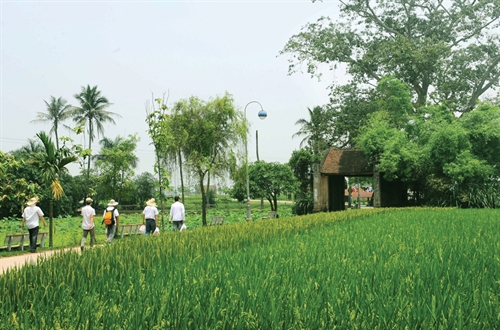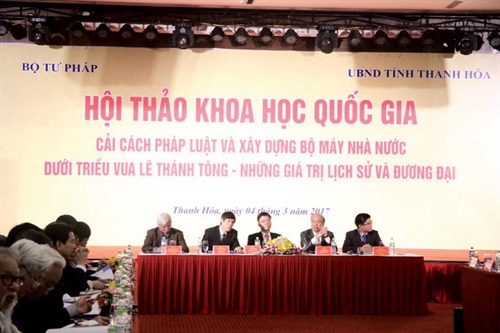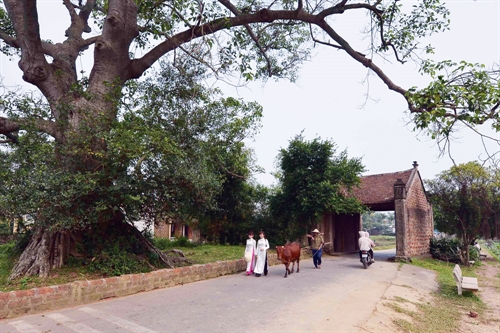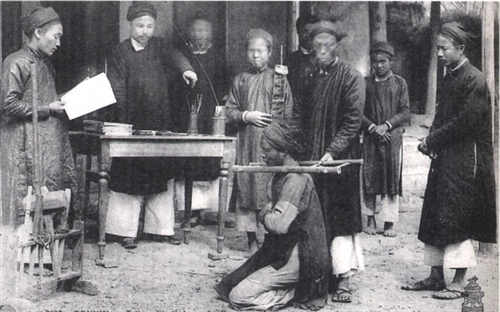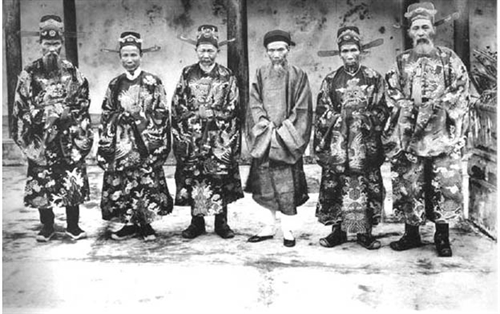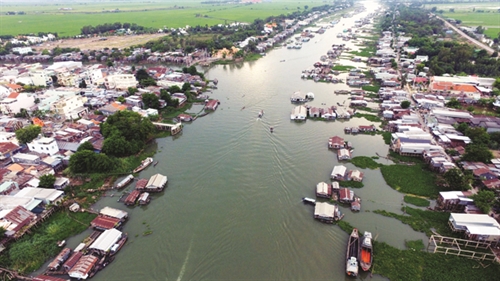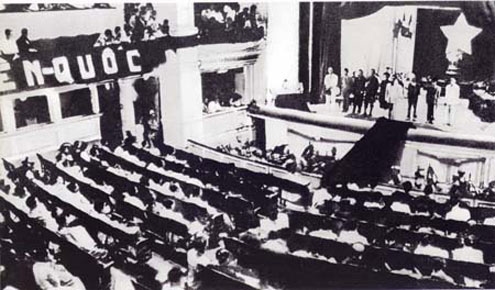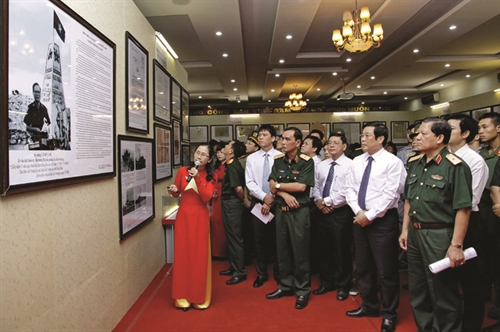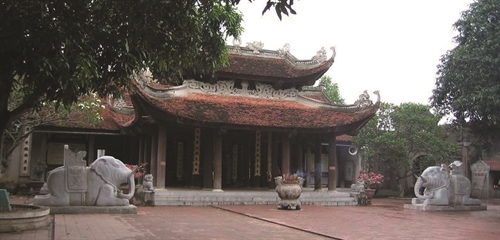Dr. Truong Vinh Khang
State and Law Institute of Vietnam
King Le Thanh Tong ruled feudal Vietnam from June 1460 to February 1497 under two reign names of Quang Thuan (1460-1469) and Hong Duc (1470-1497), creating a “prosperous” empire with expanded territory, peaceful society and admiration by foreign countries. He was evaluated by many feudal historians in their writings in “Dai Viet Su Ky toan thu”[1] as the “founder of a regime with everything going smoothly and territory widely expanded.” Although such writings dwelt on various practical political, legal, economic and particularly cultural solutions applied by Le Thanh Tong, they failed to inquire into the Emperor’s views on ruling the country, which dictate his practical solutions. So, this writing aims to clarify Le Thanh Tong’s conception of the relationship between the state and the people and underlines the similarities and disparities between the past and the present in order to find experiences for establishing a healthy state-people relationship in light of promoting democracy and ensuring the people’s power in today’s Vietnam.
History shows that during his 38 year-tenure, Le Thanh Tong tirelessly followed his deep aspiration for a centralized bureaucratic absolute monarchy that guarantees the power and interests of the feudal class represented by the Le dynasty. Immediately after ascending the throne, Le Thanh Tong sped up the introduction of Confucianism into the country on which he developed his conception of ruling the country.
According to oriental Confucian perception, the country and the state did not belong to people but to the king and the king was usually identical with the country and the state. In other words, in a country, the king had supreme power and the state was none other than the model with the entire state power concentrated into the king’s hand, that is the centralized monarchy.
The Confucian monarchy was characterized by two basic social relations: (1) the king-people relation, in which the king acted on behalf of heaven to rule the people and had to protect the people while the people had to absolutely submit to the king and his aristocrats as well as mandarins; and (2) the king-subject relation, in which the king was supreme and the person who bestows honors and bonuses to aristocrats and mandarins who, in their turn, had to be absolutely loyal to the king. These two basic political relations constituted the root of the bureaucratic hierarchy, rank hierarchy and patriarchal hierarchy - the three fundamental hierarchies of a feudal state and society.
While advocating the building of a centralized monarchy, Confucianism, in its teaching, recognized the people’s position and encouraged the king to love, care for and act for his people: “dan duy bang ban (people constitute the root); dan vi quy (people are precious); dan di dan vi thien (the king considers people as the heaven)...”.
Like other great kings of powerful oriental dynasties, Le Thanh Tong was fully aware that to consolidate the Confucian feudal regime, the root of country, namely people, must be taken care of. Thus, Le Thanh Tong developed the idea of the state’s responsibility toward people. The state must keep people in peace and make them well off, without moaning and resentment. So, the king and mandarins must care for the people, paying attention to their interests, protecting them and constantly listening to their opinions.
The idea on the state’s responsibility toward people stemmed, first of all, from Le Thanh Tong’s conception of the people’s role and position. However, he just only stopped short of considering and loving people as subjects of ruling, who must be nurtured, consoled, loved and saved. By doing so, the king would be an enlightened ruler and the subjects be virtuous. Otherwise, the king would be a tyrant and the subjects be despicable. Le Thanh Tong and persons during his time never regarded the people as holders of the state power or as the root of the royal state power. Therefore, a kind of populism could be seen in Le Thanh Tong’s thinking, which, however, came “from above”, playing second to the monarchical power.
Meanwhile, he clearly defined the responsibility of mandarins toward people. In his various decrees and orders, Le Thanh Tong not only pointed to the necessity to calm people but also clearly stated the requirement of the official duty of mandarins. For example, in 1485, he issued a decree clearly stating: “Politeness and uprightness will promote the people’s will, agricultural production will bring adequate food and clothing; these two urgent tasks rest with mandarins.”[2] Also in that decree, Le Thanh Tong demanded: “From now on you [mandarins] must abandon bad practices, wholeheartedly execute royal decrees, must make inspection tours to localities where people suffer from hunger and cold. District mandarins must annually examine land, advising people to practice farming so that people can produce surplus food and will not abandon their native places as they did in the past when famine occurs. While making inspection tours, you must explain previous decrees and teachings to people so that they can understand and follow, correct their faults. Those who do things detrimental to state regulations or traditional customs and practices must be admonished or punished; those who display loyalty and dutifulness should be rewarded. By doing so, people will be upright and kind-hearted and give up dishonesty and ungratefulness.”[3]
In 1471, in a meeting with mandarins in Son Nam district on administrative tasks in the locality, Le Thanh Tong admonished: “You are big wigs but fail to abide by the royal court’s policy to love and nurture people and only pay heed to trifling things. Now, you, the district mandarins must go to inspect mountainous and coastal areas where crop fields can be built, dikes and canals can be constructed; or places where beasts do harm, village tyrants incite litigations, bad customs and practice exist and where people suffer agony, good things should be done while evil things done away with. All those things must be reported within 100 days. Those who delay it will be punished...”[4].
In 1470, Le Thanh Tong ordered heads of provincial departments to conduct regular assessments of mandarins under their charge for transfer, commendation or punishment based on specific criteria such as good performance: Whether they are loved by people; whether they show love to people; whether residents in their localities flee to other areas. In the decree on such assessment, Le Thanh Tong instructed: “... To work out regulations on assessment of mandarins in areas under their charge. When assessing mandarins under their charge, chief mandarins must take into account the achievements recorded by mandarins in their work performance. If they truly care for and love people, are loved by people and very few residents in their localities flee to other places, they deserve their positions. If they are corrupt, harass for bribes, do things for their own benefits, and many residents under their management flee away, they do not deserve their positions.”[5]
A decree of Le Thanh Tong in the book entitled “Hong Duc thien chinh thu” (Hong Duc Edicts and Decrees) (Article 113) also reflected his perception on mandarins’ obligations: “Mandarins are dignitaries in villages, who can adjust customs and practices. So, you must teach the people in politeness, uprightness and sense of dignity, making them kind-hearted and generous, abandon dishonesty so that they can live and work in peace and contentment, so you will be honored as village patriarchs.”[6]
Le Thanh Tong’s thinking was clearly manifest not only in his words but also through specific measures to consolidate the social foundation of the state. Being fully aware that “people consider food as heaven” and “ people will be as kind as Buddha when they have adequate food and will be ghost if they are hungry,”[7] he urged “to produce more salt, fishes and rice for the people and to levy low taxes.”[8] Le Thanh Tong’s populism focused on ways how the state would take care of the people’s economic life, mainly through promotion of agricultural production including division of public land, building of water supply canals, provision of relief upon crop failures, control of drought and crop pests...
Also from his conception that “people are the root of the country,” Le Thanh Tong attached importance to the employment of talented persons, creating opportunities for persons of low class to join mandarindom. Especially with his idea of “treating people as his own children,” Le Thanh Tong applied numerous measures, primarily legal ones, to protect the people. Many specific examples can be cited from Hong Duc Code initiated by the king.
Hong Duc Code contains many provisions against harassment and oppression of the poor by mandarins and village tyrants. Articles 193, 256, 299, 301 and 302 impose heavy penalties on petty mandarins abusing their authority to force people to do things for their own benefits. Article 337 imposes “biem” (rank degrading) on influential persons who coerce commoners to marry their daughters to them. Articles 421 and 469 forbid all acts of maltreatment against people by mandarins and village tyrants; Articles 460, 461 and 530 impose heavy penalties on mandarins who availed themselves of arresting burglars to appropriate property of people; Article 637, 638 and 672 prohibit local mandarins from forcing people to contribute money and objects for their own use.
The Code devotes 11 articles to the protection of the people’s rights to freedom and against enslavement.
It also contains many articles on protection of minority people, the lonely and disabled, widows, the aged, children, women... in the spirit of respecting personal rights. For instance, Articles 293 and 294 stipulate the responsibility of local mandarins to provide relief for the poor and sick; Article 324 ensures equality in tax payment between the rich and the poor; Article 156 and 197 prescribe severe punishment against judges who breach legal proceedings, affecting the interests of the poor; Article 380 prescribes the rights of adopted children.... Especially, the Code’s provisions on personal and property rights of women express the respect for women, which were totally different from the contemporary Confucian spirit. Under these provisions, women were entitled to own their personal property, to manage their deceased husbands’ property and to own half of their common property (Articles 374 thru 376); entitled to inherit cult-portion land when their parents passed away without sons (Articles 391 and 395). Moreover, the Code contains some provisions on the wives’ personal rights, which could not be found in any oriental Confucian code. Article 308 states: “If a husband abandons his wife for five months (with the wife’s report to the local mandarin and the witness of a village mandarin), he will lose his wife. If they already have a child, such time limit will be one year. If the husband goes far away on duty, this law will not apply.”
In short, the state-people relationship constitutes a part and parcel of Le Thanh Tong’s idea on the state and law. Having inherited the spirit of benevolence and righteousness of forefathers, the king based himself on Confucianism to love and care for the people and to some extent placed the state in the position of respecting the people.
Le Thanh Tong’s idea on the state’s responsibility toward the people bears some value until today although in essence the state’s responsibility perceived by him is not identical to the requirement on the role and responsibility of the state serving the people as well as the reciprocal responsibility between the state and people according to present-day thinking.
In Vietnam, building a law-rule socialist state of the people, by the people and for the people has been defined as the focal task of the period of transition toward socialism. The root of a rule-by-law state is the establishment of democracy, namely the recognition and guarantee of the principle that sovereignty and all powers belong to the people. In other words, the state power in a rule-by-law state must be the authentic product of the will of people. The democratic nature of a law-ruled state is that the people are regarded as the country’s masters and the root of the state power. Hence, all decisions and actions of power institutions must originate from the people’s will.
The above requirements on a law-ruled state are not totally identical to Le Thanh Tong’s idea on the state-people relationship. His idea consists in the responsibility of the state (the king) to care for the people in their capacity as subjects of the ruling and for the benefit of the ruler. The advocacy of and practical actions for fulfilling the responsibility of the state (the king) in relation to the people is a similarity within the substantial disparity between Le Thanh Tong’s thinking on the state’s responsibility toward the people and the thinking on a law-ruled socialist state of the people, by the people and for the people in present-day Vietnam.-
